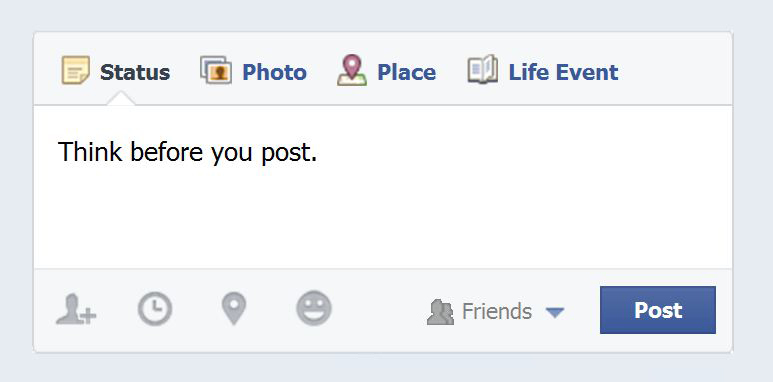 I have researched several articles about the misuse of technology leading to lawful termination of educators, school staff (college), business men/women, and government officials. I am disturbed by the careless nature individuals have been abusing technology (i.e. social media websites) within the workplace and believe it or not in the “privacy” of their home. Here are some examples of how people in various work environments lost their jobs for remarks and/or photos posted on social media websites.
I have researched several articles about the misuse of technology leading to lawful termination of educators, school staff (college), business men/women, and government officials. I am disturbed by the careless nature individuals have been abusing technology (i.e. social media websites) within the workplace and believe it or not in the “privacy” of their home. Here are some examples of how people in various work environments lost their jobs for remarks and/or photos posted on social media websites.
According to Scott Jaschick (Inside Higher Ed), a Stanford University Assistance Admission Director made several posts on social media in reference to their preference of alcohol, black men and use of profanity. In addition, they use the school social media accounts to “like” items on their personal Facebook account. Unfortunately, this is not an isolated case. An other admission employee at Pennsylvania University, mocked prospective students by posting information from applications on their private social media websites. (https://www.insidehighered.com/admissions/article/2018/01/22/stanford-case-illustrates-dangers-admissions-officers-social-media)
Liz Wolgemuth (U.S. News), writes about five different instances where the improper use of computer at work lead to dismissal of an employee. 1) A producer for one of CNN’s morning shows would blog (without any filters) about guest from the show. Despite, not referencing they were a CNN employee in the posts the individual was termination for not complying with company policy ” is that employees must first get permission to write for a non-CNN outlet.” 2) Mayor Bloomberg fired an employee after noticing an employee playing solitaire on the office computer. Mayor Bloomberg stated, “I expect all city workers, including myself, to work hard.” Richard Bayer (economist, Five O’Clock Club), states, “It’s a new, 21st-century form of theft.” 3) Several employees at a Washington Government City office were fired for viewing pornography type websites on office computers. 4) A mayor was dismissed after constituents discover inappropriate pictures posted on their social media page in their undergarments. 5) Writing r-rated emails is a sure way to the unemployment line. (https://money.usnews.com/money/careers/articles/2008/03/11/5-ways-your-computer-use-can-get-you-fired)
CNN’s Ryan Broderick and Emanuella Griberg, complied and list of employees who were fired for various ways they inappropriately used social media websites whether on personal time or during business hours. The lists covers coffee house/pizzeria employees, celebrities, foreign politicians, MLB players, educators, and Australian miners. (http://www.cnn.com/2013/06/06/living/buzzfeed-social-media-fired/index.html)
Mike Simpson, wrote an article, “Social Media Nightmares,” for New Jersey Education Association (NEA). Within this article Mr. Simpson explains teacher’s social media posts are not covered under the First Amendment and there is no such thing as privacy using company’s computers nor when you are off duty. Within the article Mr. Simpson informs readers that news reporters surface social media websites to catch individuals in compromising situations then they report it during the five o’clock news broadcast or in the local newspaper where the person lives. One case is where a college senior majoring in Education was fired for inappropriate content on her MySpace account. She was kicked out of the teaching program for “unprofessional” posts on her personal account. Where the young woman crossed the line is when she invited her students to visit her page. There are more stories like this within the article I urge everyone to read. (http://www.nea.org/home/38324.htm)
Lastly, back in April 2014 the New Jersey School Association Board (NJSAB), released a revised policy for the use of social media for teachers and students to adhere to which Governor Christie. The new “the legislation, S-441, which requires local school boards to have policies governing the use of social media communication between teachers and students.” The new policy is designed to prevent any inappropriate misuse or abuse of social media on the part of the educator and or student. There is a link provided within the article for the new policy (I think everyone should). This article is truly informative for future and established teachers to ensure they are educated about the repercussions of inappropriate, insensitive, abusive, etc. language, images, and posts to their social media accounts while at work or in the “privacy” of their home. (https://www.njsba.org/news-publications/press-releases/n-j-school-boards-association-issues-model-social-networking-policy/)
You may ask yourself, “Why am I not allowed to post what I want on my private social media accounts?.” The answer is plain and simple, when you are the world wide web there is not a such thing as “private” “personal.” You open yourself up to the world to see your pictures and thoughts. By now everyone should be aware that what you post to your accounts are out there forever. A future employer do not care if you were young and in college having a good time; a college admissions director do not know you were not intoxicated when your friends decided to write all over you (with sharpies) with inappropriate words and images, they will jump to conclusions about you and then reject your application; lastly your next employer is not going to be understanding and overlook you were fired for abusive language on social media about your previous employer and job. A word of advice, before you post on social media stop and think will this prevent me from getting my dream job or being accepted into my dream college. Remember, everything you do online can be viewed by anyone, at anytime, anywhere, with or without your permission.